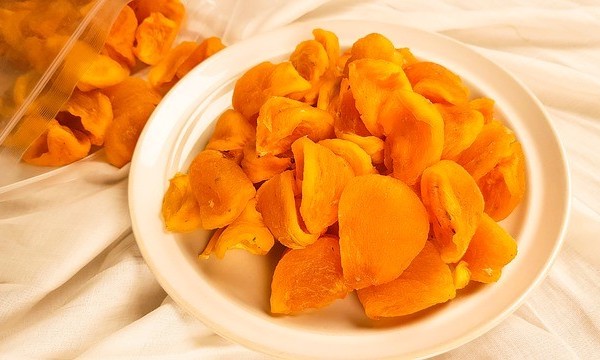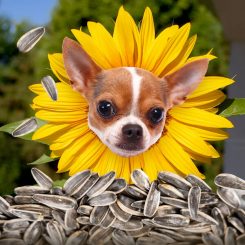
Persimmons are a popular fruit during the fall seasons. They’re sweet when ripe with a silky and smooth texture. Before eating this berry fruit, I prefer to peel off the skin. As I’m removing the skin, my two dogs would sit near me and drool. Before I gave them each a slice, I wondered, “Can my dog eat Persimmon?” Here’s the short answer first.
Can dogs eat Persimmons? Yes, dogs can eat Persimmons in moderation since they are packed full of essential vitamins, minerals, and fiber. Before you feed this sweet and tangy fruit to your canine friends, both the seeds and the pit need to be removed. While the pit and the seeds aren’t toxic, they can cause digestive issues. Avoid feeding your pups too many Persimmons as this can cause diarrhea in dogs.
In this article, we’ll discuss everything you need to know about Persimmons and dogs, including what specific vitamins and minerals are in Persimmons, how they benefit your dog’s overall health, and in what ways can Persimmons be bad for dogs.
Table of Contents
Can dogs have Persimmons?

Yes, dogs can have Persimmons in moderation. There are many health benefits of feeding your furry friends a moderate amount of Persimmon. However, too much of anything good can be bad.
To see why that is, let’s first take a look at the nutritional profile of a Persimmon:
Nutritional Profile of Persimmon (1 fruit or 170 grams)
| Name, Unit | Amount |
| Calories, cal | 119 |
| Sugar, g | 21.2 |
| Sodium, mg | 1.7 |
| Carbohydrate, g | 31.6 |
| Total Fat, g | 0.323 |
| Protein, g | 0.986 |
| Fiber, g | 6.12 |
| Calcium, mg | 13.6 |
| Iron, mg | 0.255 |
| Magnesium, mg | 15.3 |
| Phosphorus, mg | 28.9 |
| Potassium, mg | 274 |
| Zinc, mg | 0.187 |
| Copper, mg | 0.192 |
| Selenium, µg | 1.02 |
| Vitamin C, mg | 12.8 |
| Thiamin (B1), mg | 0.051 |
| Riboflavin (B2), mg | 0.034 |
| Niacin (B3), mg | 0.17 |
| Vitamin B-6, mg | 0.17 |
| Folate (B9), µg | 13.6 |
| Vitamin A, µg | 138 |
| Carotene, beta, µg | 430 |
| Cryptoxanthin, beta, µg | 2460 |
| Lycopene, µg | 270 |
| Vitamin E, mg | 1.24 |
| Vitamin K, µg | 4.42 |
Let’s also take a look at the nutritional profile of just one slice or 20 grams of Persimmon:
Nutritional Profile of Persimmon (1 slice or 20 grams)
| Name, Unit | Amount |
| Calories, cal | 14 |
| Sugar, g | 2.5 |
| Sodium, mg | 0.2 |
| Carbohydrate, g | 3.72 |
| Total Fat, g | 0.038 |
| Protein, g | 0.116 |
| Fiber, g | 0.72 |
| Calcium, mg | 1.6 |
| Iron, mg | 0.03 |
| Magnesium, mg | 1.8 |
| Phosphorus, mg | 3.4 |
| Potassium, mg | 32.2 |
| Zinc, mg | 0.022 |
| Copper, mg | 0.023 |
| Selenium, µg | 0.12 |
| Vitamin C, mg | 1.5 |
| Thiamin (B1), mg | 0.006 |
| Riboflavin (B2), mg | 0.004 |
| Niacin (B3), mg | 0.02 |
| Vitamin B-6, mg | 0.02 |
| Folate (B9), µg | 1.6 |
| Vitamin A, µg | 16.2 |
| Carotene, beta, µg | 50.6 |
| Cryptoxanthin, beta, µg | 290 |
| Lycopene, µg | 31.8 |
| Vitamin E, mg | 0.146 |
| Vitamin K, µg | 0.52 |
Is Persimmon good for dogs?
Yes, Persimmon is good for dogs since this silky yet slippery textured fruit is packed full of antioxidants from essential vitamins like vitamin A, B, and C as well as fiber, lycopene, potassium, and manganese.
Let’s discuss each of these in more detail below and see how they help benefit your dog’s overall health.
Vitamin A in Persimmons supports bone growth and vision in dogs
If you have a puppy, offering them treats or snacks that are packed full of vitamin A such as Persimmons is a good idea. That’s because vitamin A is also known as retinol, a fat-soluble vitamin that supports bone growth, vision, and immune response in dogs.
All dogs, whether young or old, need vitamin A. Their bodies store vitamin A in the fat cells and it helps with the following:
- Healthy skin and coat.
- Support vision.
- Brain development.
- Skeletal development.
- Cell differentiation (cell division and growth).
- Improve immune response.
If your pooch has vitamin A deficiency, you can offer him or her a moderate amount of Persimmon. It has been proven that vitamin A deficiency stems from malabsorption and even genetics. Dog breeds that are most susceptible to vitamin A deficiency include:
- Miniature Schnauzer.
- Labrador Retriever.
- Cocker Spaniel.
- Shar-Pei.
Don’t feed your pooch too many Persimmons because that can cause an overdose of vitamin A in dogs. Remember, too much of anything good can actually be bad.
Signs and symptoms of vitamin A overdose in dogs include:
- Vomiting.
- Abnormal bone growth.
- Joint stiffness.
- Loss of appetite.
- Lethargy.
- Seizures.
- Paralysis.
- Avoiding contact with both people, animals, and other pets in the house.
If you suspect that your pooch has a vitamin A overdose, consult your vet immediately.
Fun Fact: Apricots are also packed full of vitamin A as well. But are apricots safe for doggy consumption? Check out Can Dogs Eat Apricots? to find out!
Vitamin B in Persimmons promotes good overall health in dogs of all ages
As we can see from the nutritional profile of Persimmons above, this sweet fruit contains various B vitamins such as:
- Vitamin B1 or Thiamine.
- Vitamin B2 or Riboflavin.
- Vitamin B3 or Niacin.
- Vitamin B-6.
- Vitamin B9 or Folate.
Vitamin B1 or Thiamine
In order to maintain optimal health in your dogs, you’ll need to feed them a diet that contains vitamin B1. Dogs that have a sufficient amount of vitamin B1 intake will have proper brain and organ functions. Thiamine is a water-soluble vitamin and our dogs need this nutrient daily.
Vitamin B2 or Riboflavin
Vitamin B2 or riboflavin is another essential B vitamin that our four-legged friends need. That’s because riboflavin helps to break down fat, carbohydrates, and protein and convert them into energy so your pups can stay active and happy. Additionally, vitamin B2 is crucial for DNA repair and growth.
Vitamin B3 or Niacin
Niacin or vitamin B3 acts as an antioxidant. Its role is similar to riboflavin or vitamin B2 in that as an antioxidant, it can help to repair DNA and cells. Fortunately, many foods naturally contain vitamin B3. If your pooch is deficient in niacin, feeding them a slice of the Persimmon fruit is a good idea.
Vitamin B3 is also vital for maintaining healthy skin, gastrointestinal tracts, and nervous tissues. This vitamin is responsible for proper brain function, production of growth hormones, and good blood circulation throughout your dog’s body.
Vitamin B-6
Vitamin B-6, also known as pyridoxine, is another essential vitamin that all dogs need. If you have puppies, it’s extremely important that they have enough vitamin B6 intake. That’s because pyridoxine is responsible for synthesizing protein which helps promote healthy growth in puppies.
Not only that, pyridoxine helps the dog’s body absorb protein and fats as well as to maintain a proper balance of potassium and sodium.
Similar to other B vitamins, vitamin B3 also promotes proper red blood cell production and healthy brain function. With sufficient Vitamin B-6 intake, your furry friends will have a healthy bladder and good blood flow.
Did you know? 33 grams of sunflower seed kernels contain 1 mg of vitamin B-6, 3 mg of niacin or vitamin B-3, and 75 µg of folate or vitamin B9. They’re great for us, but are they healthy for our K9 pals? Check out Can Dogs Eat Sunflower Seeds? to find out!
Vitamin B9 or Folate
Lastly, folate or vitamin B9 is crucial for dogs of all ages. Whether you have a young puppy, an adult dog, or a pregnant dog, folate can help with proper cell growth and blood formation and facilitate immune function, tissue growth, and cell division.
Next, let’s see how vitamin C helps benefit your dog’s overall health.
Vitamin C in Persimmons is an important antioxidant that all dogs need
There’s no question that vitamin C is an essential antioxidant that our canine friends need every day. Antioxidants play a crucial part in getting rid of harmful free radicals in the dog’s body. These harmful free radicals cause inflammation and cell destruction in dogs.
When dogs eat a slice or two of Persimmons, they can get an extra boost of antioxidants which can help to reduce cognitive aging and inflammation.
Although our dogs’ liver can produce vitamin C, an extra boost of vitamin C and antioxidants is never a bad thing.
Fun Fact: Cruciferous vegetables like Brussel Sprouts is packed full of vitamin C. But are Brussel Sprouts safe for dogs to eat? Check out Can Dogs Eat Brussel Sprouts? to find out what happens if dogs eat too many Brussel Sprouts!
Fiber in Persimmons helps promote healthy digestive system in dogs
Offering your pooch a slice of Persimmon is a good idea because one slice of Persimmons contains 0.72 grams of fiber. Since fiber is fermented in the large intestine, it takes longer to digest which means your dog stays full longer.
All dogs need fiber in order to have regular bowel movements. That’s because fiber helps to absorb excess water and increase bulk so the stools are formed and firm.
Additionally, fiber helps to promote a healthy digestive system in dogs. By producing the right intestinal pH level in the dog’s gut, it helps to slow down the growth of bad bacteria. Thus, your canine friends will be happier with a healthy gut that has a balance of good and bad bacteria.
So go ahead and cut a slice of that sweet Persimmon for your four-legged friends that’s salivating over there!
However, it’s also a good reminder not to feed your pups too many Persimmons as too much fiber can actually be bad for dogs.
Here’s why:
When dogs consume too much fiber, their body will have a difficult time absorbing essential minerals.
Also, they may start to have diarrhea or feel the sudden need to poop. Some dogs may still be inside the house when they suddenly feel the urge to poop and as a result this can lead to accidents on your carpet, sofa, or hardwood floor.
Other dogs may need to head out several times to poop after they’ve consumed the Persimmons.
So be careful with how many Persimmons you’re feeding your canine friends.
You may be interested in: Can Dogs Eat Chickpeas?
Lycopene in Persimmons helps fight cancer cells in dogs
Another powerful antioxidant in Persimmons is lycopene. In just one slice of Persimmon, there is 31.8 µg of lycopene. This necessary antioxidant can help promote eye health, skin and coat health, and fight cancer cells in dogs.
Therefore you can rest easy knowing that the lycopene in Persimmon can help to reduce the possibility of cancer in your furry friends when you feed them a slice or two of this fruit.
Not only is lycopene an antioxidant, but it is also a carotenoid. This is what gives the Persimmon its yellowish orange color.
If your pooch is not feeling well, has cancer, eye or cataract issues, allergies, or respiratory problems, try feeding him or her a few slices of Persimmon.
Check out: Pomelo also contains lycopene antioxidants, which lowers inflammation in dogs. Check out Can Dogs Eat Pomelo? to find out if your furry friends can safely eat this fruit.
Are Persimmons bad for dogs?
Yes, Persimmons can be bad for dogs under these two circumstances:
- If your canine companions ate the whole fruit, including the seeds and the pit
- Your four-legged friends ate too many Persimmons.
There are usually 5 to 8 seeds in a given ripe Persimmon fruit. Keep in mind that depending on which type of Persimmons you buy from your local grocery store, some are seedless like the Meader American Persimmon.
Before you offer Persimmons to your pooch, be sure to slice it open, remove the pit, and check for any seed. Careful inspection is necessary because the seeds and the pit can be a choking hazard. You’ll want to keep an eye on your fur babies when they’re eating Persimmons.
Also, our furry friends aren’t able to properly digest the seeds or the pit. When the seeds or the pits are consumed, they can get stuck inside your dog’s small intestines. As a result, both the seeds and the pits can cause intestinal blockage and this can lead to digestion issues and bowel obstruction.
Moderation is key when you feed your dogs Persimmons because consuming too many can cause vomiting or a nasty diarrhea due to the high fiber content in this fruit.
Persimmons are known to be natural laxatives so eating too many can also lead to upset stomach in dogs.
This is why it’s crucial to follow the 90/10 rule when it comes to our furry friend’s daily calorie intake. 90% of their calories should come from a balanced and complete diet while only 10% should come from snacks or treats. In this case, the Persimmon fruit is considered a doggy treat and we should be careful with how many we are feeding to our pooch.
Question of the day: Plums also contains pits. Once the pits are removed, can you offer some of the Plum flesh to your four-legged friends? Check out Can Dogs Eat Plums? to find out. We’ll also let you know what the pit contains and how it can be bad for dogs.
Dogs and Persimmons
Can dogs eat Persimmon skin?
Yes, dogs can eat Persimmon skin in moderation since it is a great source of vitamin C, fiber, and antioxidants. The skin of the Persimmon is safe for doggy consumption and won’t cause any harm.
If your pooch has never had Persimmon skin before, you’ll want to give him a small amount (one 1-inch peel) and see if he experiences any adverse reactions.
If your dog isn’t feeling well, vomiting, or has other negative reactions after eating the Persimmon skin, do not give him anymore Persimmon skin and contact your vet immediately.
Dogs that do not have any problems after consuming the Persimmon skin can continue to eat it.
So our advice is to start with a small amount and then gradually increase the amount. For instance, go from feeding your pooch one 1-inch Persimmon peel to one 2-inch Persimmon skin.
Later when you know that your pooch can eat Persimmon skin without a problem, you can give him a slice of Persimmon with the skin on (no need to peel it). However, you’ll still want to make sure the pits and the seeds are removed first.
Are Persimmon seeds edible for dogs?
No, Persimmon seeds are not edible and dog owners should remove the seeds as well as the pit before feeding this fruit to their K9 friends. Our furry family members aren’t able to properly digest the Persimmon seeds and they can actually cause intestinal blockage and bowel obstruction in dogs.
Persimmon seeds can also be a choking hazard so to eat this fruit safely, both the seeds and the pit should be removed.
Can dogs eat dried Persimmons?

Yes, dogs can eat dried Persimmons in moderation. Moderation is key when feeding your dogs dried Persimmons because they do contain tons of sugar. When fruits like Persimmons dry up, the sugar level increases.
Too much sugar intake can lead to health issues such as diabetes, cavities, tooth decay, canine obesity, changes in metabolism, upset stomach, imbalance of good and bad bacteria in the gut, and even pancreatitis.
Can dogs eat Persimmon leaves?
Yes, dogs can eat Persimmon leaves, however, in most cases, your dog may not even want it since the leaves taste bitter. If you have a Persimmon tree in your backyard, make sure your canine companions don’t get too close to them. Although the leaves won’t hurt them, they do contain tons of fiber.
Dogs love to explore their environment so their curiosity may lead them to eat a few leaves off your Persimmon tree and this can lead to an upset stomach in dogs.
It’s a good idea to keep an eye on your pooch when he is in your backyard, especially if you have a Persimmon tree.
DISCLAIMER: THIS WEBSITE DOES NOT PROVIDE MEDICAL ADVICE
The information, including but not limited to, text, graphics, images and other material contained on this website are for informational purposes only. No material on this site is intended to be a substitute for professional veterinary advice, diagnosis, or treatment. Always seek the advice of your veterinarian or other qualified health care provider with any questions you may have regarding dietary needs.
Resources:
https://www.sciencedirect.com/topics/agricultural-and-biological-sciences/persimmon
https://www.jstor.org/stable/42883464

With over five years of specialized experience as an animal writer, my expertise lies in dog nutrition, health, behavior, grooming, and training. I am dedicated to delivering helpful and informative content that caters to the well-being of our furry friends. My primary goal is to empower pet owners with knowledge and ensure our canine companions thrive in health and happiness. In my free time, I love volunteering at local dog rescue centers.







